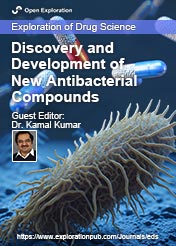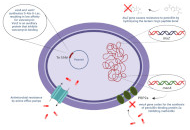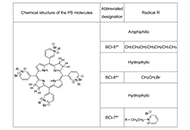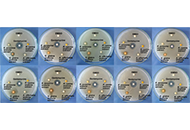
Discovery and development of new antibacterial compounds
Guest Editor
Kamal Kumar E-Mail
Head, Medicinal Chemistry, Smartbax GmbH, Oberschleißheim, Germany
About the Special lssue
The increasing resistance of pathogenic bacteria to various antibiotics poses a concerning threat to the effective treatment of bacterial infections and thereby to the human race. For instance, a recent detection of a strain of Neisseria gonorrhoeae in the United States with reduced susceptibility to all standard-of-care (SOC) antibiotics, highlights the alarming situation and the urgent need to find novel and effective antibacterial molecules. However, the fact that no novel antibacterial drug classes have been discovered and developed for clinical use since late 1980s, is deeply disappointing and calls for more coherent efforts from academia and industrial research in antibacterial discovery.
The last two decades have witnessed some major investments in research strategies, for instance, modification of existing antibacterial classes, repurposing of old drugs, to develop combination therapies etc. and these areas of research are not yet completely explored and remain potential sources of new antibacterial molecules. Furthermore, modification of natural products as well as natural product-inspired or based compound collections remain underexplored and underexploited to identify hit-to-lead antibacterial small molecules. Small molecules with novel or multiple antibacterial targets may offer solution to the emerging challenge of multidrug resistant infections. In particular, novel compound classes are highly desired to treat infections caused by gram negative bacterial pathogens, for instance, ESKAPE pathogens that possess additional membrane barrier and a strong capability to efflux out antibacterial compounds. Destabilizing the outer membranes of such bacterial may also render the SOC antibiotics more effective.
In this special issue, we seek submission of articles focused on discovery and development of antibacterials, including diverse modalities that may include non-peptidic or peptidic small molecules to large molecules, natural products or their analogues etc. Articles based on early research supporting or leading to hit and lead antibacterials with novel target or multiple targets or development of modified and repurposed molecules with known known antibacterial or other activities are also welcome. Moreover, contributions focused on approaches that rely on modification of physicochemical properties of small molecules to improve their antibacterial properties or use in silico approaches to address new targets are also suitable for this issue.
Keywords: Antibacterials, ESKAPE pathogens, hybrid molecules, natural products, multidrug resistance
Published Articles


